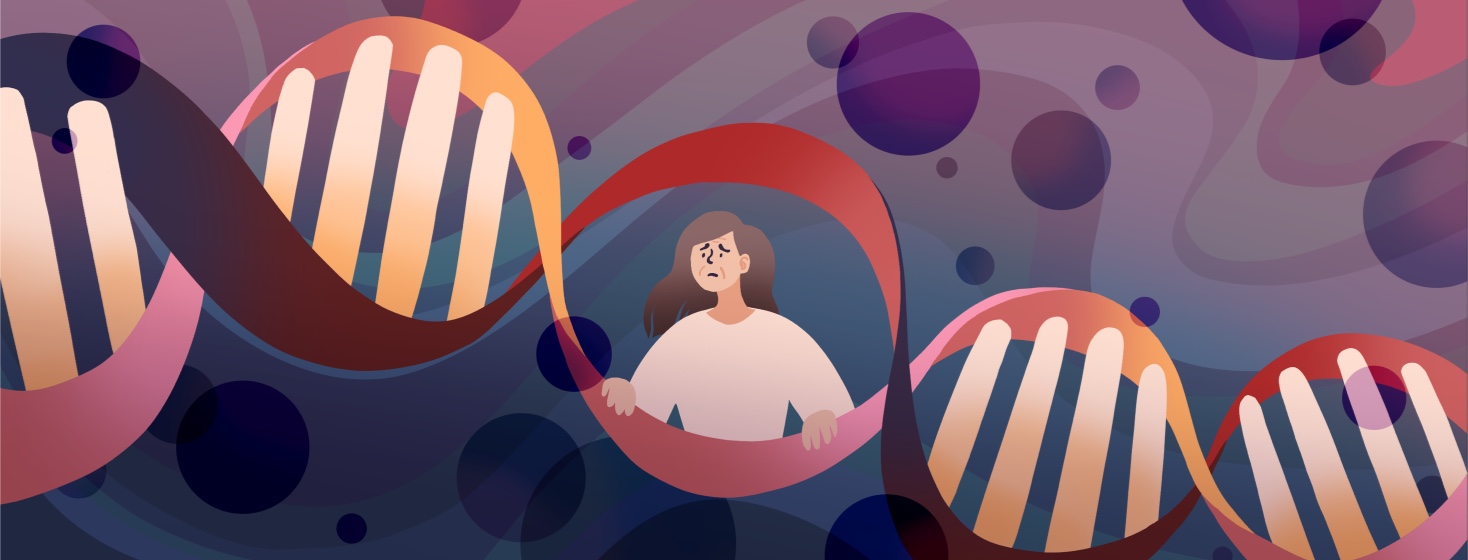Why Genetic Testing Can Be Important
Editor's note: Kate is a patient-centered health advocate and not a medical professional. Although she likes to think of herself as a professional patient living with Stage IV Breast Cancer, these views are her own and not medical advice.
I was diagnosed with stage IV HER2+ breast cancer at 28, and I had no family history of breast cancer. I did, however, have a history of other types of cancer in my family. Since I was diagnosed so young and had a hereditary risk, I met with a genetic counselor.
To understand what a genetic counselor is and what they do, it is important to understand what our genes do. While genetics is extremely complicated, knowing the basics will help you advocate for yourself.
What are genes?
Genes carry information that determines your traits like what color your eyes and hair will be or if you will have freckles. These traits are hereditary. That means they can be passed down to you from your parents.1
We have around 20,000 genes that make us who we are. Our genes are our building blocks. If one is missing, duplicated, altered, or changed in any way, you can end up with a genetic disorder.1
Our bodies have many genes whose sole purpose is to make sure that we do not develop tumors or cancer. A change in one of these genes can leave you at a greater risk of tumor development.1
What do genetic counselors do?
Genetic counselors are trained medical professionals that can assess your risk for genetic conditions that can lead to cancer. They collect your family history and your medical history to determine what genetic tests might be most beneficial for you. They explain what they are testing for and how it can affect you. And they are advocates for your comprehensive screenings.2
My genetic counselor ran a panel of known tumor suppression genes whose defects can lead to cancer. These included BRCA 1 and 2, CHEK2, and P53, to name a few. While I tested negative for most, I did test positive for a mutation in my P53 genes called Li-Fraumeni syndrome (LFS).
Having this defect in my P53 cancer suppression genes leaves me at a much higher risk of developing all kinds of cancers, including breast cancer. Even though I had a strong family history of cancer, no one else in my family had this genetic mutation. I had a de novo mutation, meaning I was the first in my family to have had this. Having this information helped me make decisions for the future.3
Genetics and my current cancer treatment
Even though I was already in active treatment for breast cancer, the increased risk of other cancers needed to be on my radar as well. My genetic counselor explained the long list of preventive screenings, tests, and procedures that I would need to start implementing in my healthcare regimen.
Not all genetic syndromes and conditions have different protocols than what is recommended for screening. These preventative measures found the pre-cancer polyps in my colon that, if left untreated, would have become cancer.
Due to a higher risk of ovarian cancer, I also chose to have a preventative oophorectomy. After fighting for this surgery for nearly two years, the surgical pathology did show cancer in my fallopian tubes, which would have eventually led to ovarian cancer if not removed. I have regular bloodwork, brain imaging, and bone scans as well.
Choosing genetic counseling
While choosing to have genetic testing is a deeply personal choice, you must think about the positives and negatives of knowing about a genetic condition. For me, knowing about my genetic condition has changed my life for the better. I can better advocate for myself concerning my health by having this information.
I found an oncologist who is familiar with Li-Fraumeni syndrome and its inherited risks, so we can make decisions about my health together. And while knowing cancer-causing mutations like LFS can be emotionally taxing, I have found a whole community of others online and in my city that I can talk to. Sometimes all you need is just someone who understands you to make even the darkest journey a little brighter.
Have you had any experience with genetic testing? Click on the forum link below to share your experience and hear from others.

Join the conversation